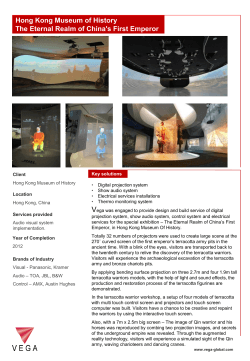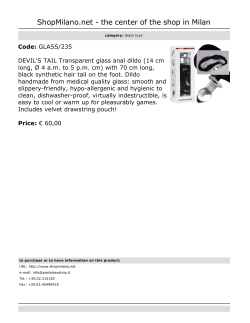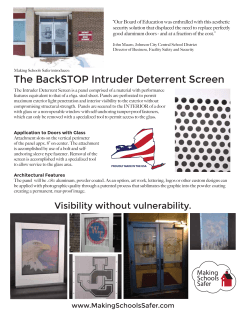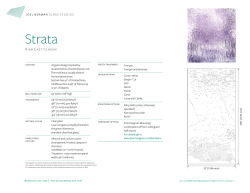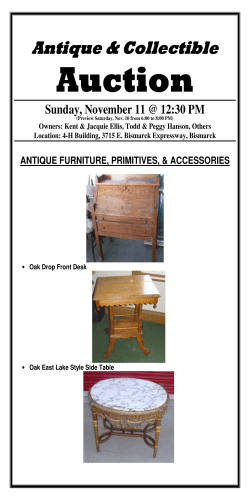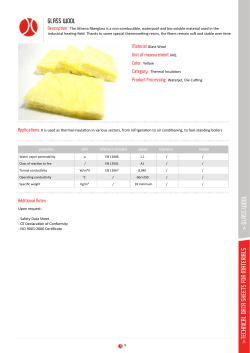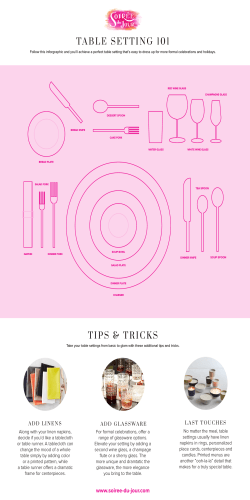
Craft Catalog - Baaya Design
art catalogue CONTENTS The catalogue gives an insight into the traditional indian art & crafts being innovatively used at Baaya Design for designing interior spaces Lippaikaam Gond art Bastar iron craft Terracotta Madhubani Glass painting Warli art Blue pottery MDF cut out Mural collage LIPPAIKAAM Lippan (means-mud washing in Gujarati) and kam (means work), is a decorative wall art done by women and men from Kutch inside local bhungas/mud huts. Artisans depict birds, trees, animals, human figures etc. It is done with a mixture of clay and camel dung. An adhesive is used to stick mirrors. The originality of Lippan kam lies in adding no colour, only white/mud outlines are used. Small round, diamond-shaped or triangular mirror pieces are essential to lippan kam. Lippai done on the walls Lippai being done in a contemporised manner GOND ART Gond tribal paintings are made in Madhya Pradesh. The paintings are expressions of rituals or practices that are deeply linked with their day to day lives, religious sentiments and devotions. Themes of Gond paintings are often based on local festivals like Karwa Chauth, Deepawali, Ahoi Ashtami, Nag Panchmi, Sanjhi etc. Horses, elephants, tigers, birds, gods, men and objects of daily life are painted in bright and multicolored hues. Tribal Gond paintings are done by the tribal women of the village using simple homemade colors. Colorful and highly expressive, this art has its own unique identity and rare beauty. Gond tree of life being painted on wall BASTAR IRON CRAFT This is an indegenious Bastar tribal craft made by local black smiths. Frames made out of wrought iron depicting the everyday life of the tribes, were used as window frames, doors and gates. The frames are made by hammering them into shape; they are not cast or moulded. They are then filed to remove sharp edges. Hollow artefacts are made out of beaten iron sheets, folded, cut, and filed to shape.The deepak or large lamp(s) comprise of a number of small, shallow crucibles, like diyas (little lamps), and vertical and horizontal rods or strips. These are ornamented with bird and animal figures that are made separately and later joined together into various types of composite lamps and hangings. A story in frames in wrought iron Wrought iron caricatures Wrought iron space divider Wrought iron picture TERRACOTTA Terracotta or natural clay is found on river banks and near water bodies. The clay, when treated with an infusion of different minerals- create color variations. However, natural terracotta, comes in shades ranging from beige to rust red. When they are fired in the furnace through a process called reduction firing, they turn black. Bamboo trees in terracotta on wall Banyan tree in terracotta & terracotta tiles on wall Hexagonal tiles in terracotta Terracotta tree on wall MADHUBANI Madhubani painting, also referred to as Mithila Art (as it flourishes in the Mithila region of Bihar), is characterized by double line drawings filled in with bright contrasting colours and intricate patterns. This painting was traditionally done by the women of the region.The main themes include images of Indian mythological characters and stories like the Ramayana and the Mahabharata, depictions of the Sun, Moon, Tulsi (the sacred basil plant) and birds and animals of the region. Scenes of royal courts and social events are also engagingly depicted in these paintings which are traditionally done with natural and mineral pigments prepared by the artist s with local materials. Madhubani painted on glass and put on the door Madhubani painted on glass and used as a space divider Madhubani painting used on the door and on the wall GLASS PAINTING Special ‘Cone’ work is used to create three dimensional outlines of the patterns which are then filled with vibrant and transparent glass inks. This craft requires a steady hand and the finesse of the line work is what distinguishes a high quality piece of art. The rich colors and well defined forms, create a look which is similar to that of stained glass work. Painted glass being utilised in the space divider Framed painted glass and put on wall Painted glass being used on the door of cupboard Painted glass being used as a window pane WARLI ART This evocative folk art comes from the states of Maharashtra and Gujarat, where there are settlements of an ancient tribe known as the ‘Warlis’. Simple, linear forms communicate the Tribe’s way of life, their social customs, the flora and fauna of their region, their occupations, harvest cycles and daily activities. Traditionally, the only color used in creating Warli paintings is white and the base is a mix of earth and natural stains like Henna and mineral colors. Earlier, women were the main repositories of this heritage and ‘Suvasins’ (married women) did the paintings on walls. The appeal of these compositions lies in their simplicity while conveying the profound. Today this art form is widely recognised and sought after in India and internationally. Warli art being done on textured wall of a resort Contemporary use of warli art on an installation at Kalaghoda BLUE POTTERY Jaipur blue pottery is unique and therefore of great interest in the past and even today. Since blue is the dominant color, it is known as blue pottery, however various other colours like yellow, green, maroon and black is also used. Jaipur pottery is not made of clay but of ground feldspar (burbura) mixed with gum or starch. It is made by hand and not on the potter’s wheel and is locally known as ‘kamchini’. The art appears to have originated in Delhi under one chief artist, named Bhola. Jaipur school of blue pottery attained its reputation and popularity through the use of two shades of Blue Cobalt and Turquoise on opaque White Tiles being utilised in the bathroom Tiles being utilised on the wall Tiles used on the doors of the cupboard MDF MDF cut out nature composition on wall MDF cut out jali MURAL COLLAGE FLAT COLLAGE Mixed flat collage Mix media collage on canvas Saura collage Santhal collage 3D mixed mural on wall Dokra & Wrought iron collage CONTACT US f u k b Tel: 022 65616632 Email us at Info@baayadesign.com Website: www.baayadesign.com STORE & STUDIO 11/12, Raghuvanshi Mills Compound, Senapati Bapat Marg, Lower Parel, Mumbai - 400013
© Copyright 2025
